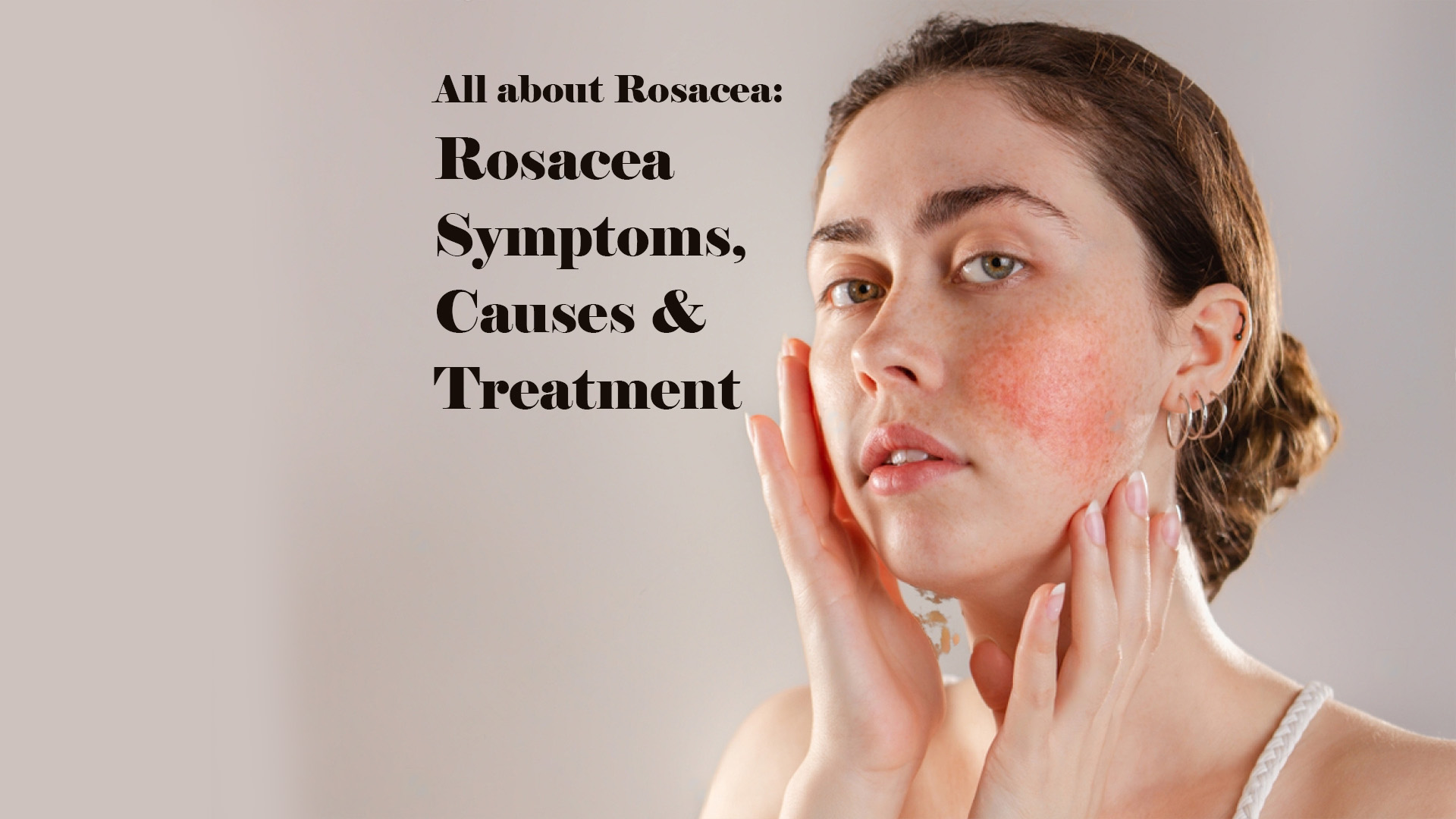Do you have Rosacea symptoms? Not sure what they are? Then scroll down to find out Are the symptoms you’re experiencing Rosacea symptoms, and if so, how should you deal with them?
Let’s start from the beginning!
Have you been neglecting skincare lately? Your skin protects you from extreme temperatures, germs, and all sorts of hazards. But while maintaining its role as a barrier, it is exposed and unguarded to those hazards itself. That is why it has to suffer from painful allergies and diseases.
Rosacea is one of those nasty skin conditions that are chronic and are not permanently curable. You may suffer from rosacea symptoms ranging from mild to harsh depending upon your age, environment, diet, and lifestyle.
But with a bit of knowledge regarding your condition, you can manage it effectively. As people with knowledge and a keen interest in helping people manage their symptoms, we (Easy Peasy Skincare) will explain them clearly.
Rosacea Causes:

Skincare experts and doctors have not reached a proper conclusion about what could be the major cause of certain skin conditions like rosacea.
But with in-depth research and constant studies, doctors and dermatologists have come up with a list of some factors that could be the possible causes of this horrid condition.
Let’s take glimpse at a few of the more key components:
Sunlight: If you are in contact with the sunlight and do not protect your skin well, you are highly at risk of getting infected with this noxious condition. Likewise, wind can irritate the skin too.
Bugs: Some bugs, like mites, can affect the skin adversely, so you need to keep your surroundings free of such insects and take care of your skin if you get bitten.
Microbes: Bacteria like Helicobacter pylori can infect the gut, which may allegedly lead to rosacea, or through secretion of bradykinin, they may dilate the blood vessels.
Hygiene: This is one of the major factors that induce skin conditions like acne, psoriases, and rosacea.
Skin type: Dry skin can get agitated pretty easily, so if you have it, you need to pay extra attention during severe weather conditions. Genetics can play their part in aggravating skin conditions.
Allergy: Certain allergens are known to make the skin around the eyes and cheeks rash and flushed.
Lifestyle: Exercise and lifestyle, along with a person’s emotions, have a lot to do with overall health.
As for the skin, sweating after exercise gives rise to the growth of microbes. And stress is the root cause of many health conditions, including those related to skin.
Diet: Now comes another important part of this section; the diet of a person. Some foods may improve, and some may worsen the disease’s symptoms.
Rosacea Symptoms:

Now, let’s go forward with the main topic of today’s discussion!
You may start noticing a few of the symptoms of rosacea, or you might face some rare ones. Easy Peasy Skincare has jotted them down for you to tally and countercheck yours with them.
Here are the Rosacea Symptoms:
Eye issues: Some people may experience discomfort in their eyes, including swelling and a sensation of a foreign object.
Visible veins: Those with this issue have almost permanently widened blood vessels that are visible. Certain foods (spicy or hot ones) and hot body temperatures can dilate the vessels, thus worsening the rosacea symptoms.
Enlarged pores: It might just be due to poor hygiene or acne, but skin thickening and inflammation are more to be blamed for those with rosacea.
Flustered cheeks: Exposure to a hot environment or having a hot drink may flush or fluster your face, which feels heat and redness.
Bulbous nose: In some patients, it causes the nose area to be thickened and enlarged. This symptom is most common in females in their middle ages.
Pimples resembling acne: If you have rosacea, you are more likely to have pus-filled pimples like acne and some bumps, too, which are red or brownish. They may be painful as well.
Red patches on the back or neck: Well, rosacea symptoms are not always limited to the face only. You can have red patches or blotches on the other parts of your skin (mostly exposed).
Itching: The burning sensation leads to an urge to scratch the affected parts. Since rosacea skin is dry, not greasy, as in acne, Itching can be troublesome.
Rosacea’s link with diet:

The skin conditions, most of the time, are directly linked with the person’s diet and water intake as well. Some foods that cause rosacea outbreaks might unknowingly be a part of your diet for many years.
Therefore, you need to know what you eat and what can trigger your rosacea symptoms or other conditions. Let’s talk about some of the foods that cause rosacea or can directly or indirectly affect your skin maliciously.
You should avoid spicy food, hot drinks, alcoholic beverages, and processed foods.
Howsoever, the good news is that you can treat rosacea with a diet too. Therefore, you do not have to starve just to avoid inciting your disease.
To know the list of Good and Bad Food for Rosacea, you can click here!
You can eat well and still take care of your skin. Foods with proteins, natural antioxidants, and good fats, i.e., Omega-3 fatty acids, are known to work exceptionally well for those having rosacea symptoms.
Can you avoid rosacea?

Applying sunscreen, using non-toxic makeup products or avoiding them in the first place, maintaining hygiene, and having a balanced intake of a healthy diet.
Moreover, avoiding foods that cause rosacea outbreaks can assist you in keeping yourself at risk of suffering from most rosacea symptoms. Additionally, you can never go wrong with drinking water. Hence stay hydrated.
Treatment:

If you have this disease, do you have to be at its mercy and do nothing about it? Nope, that’s not the case.
Your doctor may treat you according to the severity of your symptoms and your history. Antibiotics are pretty useful in lessening inflammation.
Plus, you should avoid foods that trigger rosacea at all costs. If the same treatment doesn’t improve rosacea symptoms after 12 weeks or more, consider changing the treatment with your doctor’s consent.
Final Words:
Long story short, if you experience some or a few of the symptoms discussed above, you need to see your doctor. And even if the symptoms are mild yet do not improve after some days, you should not ignore them.
As for those who have never had any of those, you can still take some steps since prevention is better than cure, isn’t it?
You can help your skin by saying no to the foods that cause rosacea outbreaks and alternating them with healthier and milder options. Redness and bumps, however, are not always rosacea symptoms.
Many other skin allergies and diseases can show similar signs, so you should never use medicines without consulting your dermatologist first.

